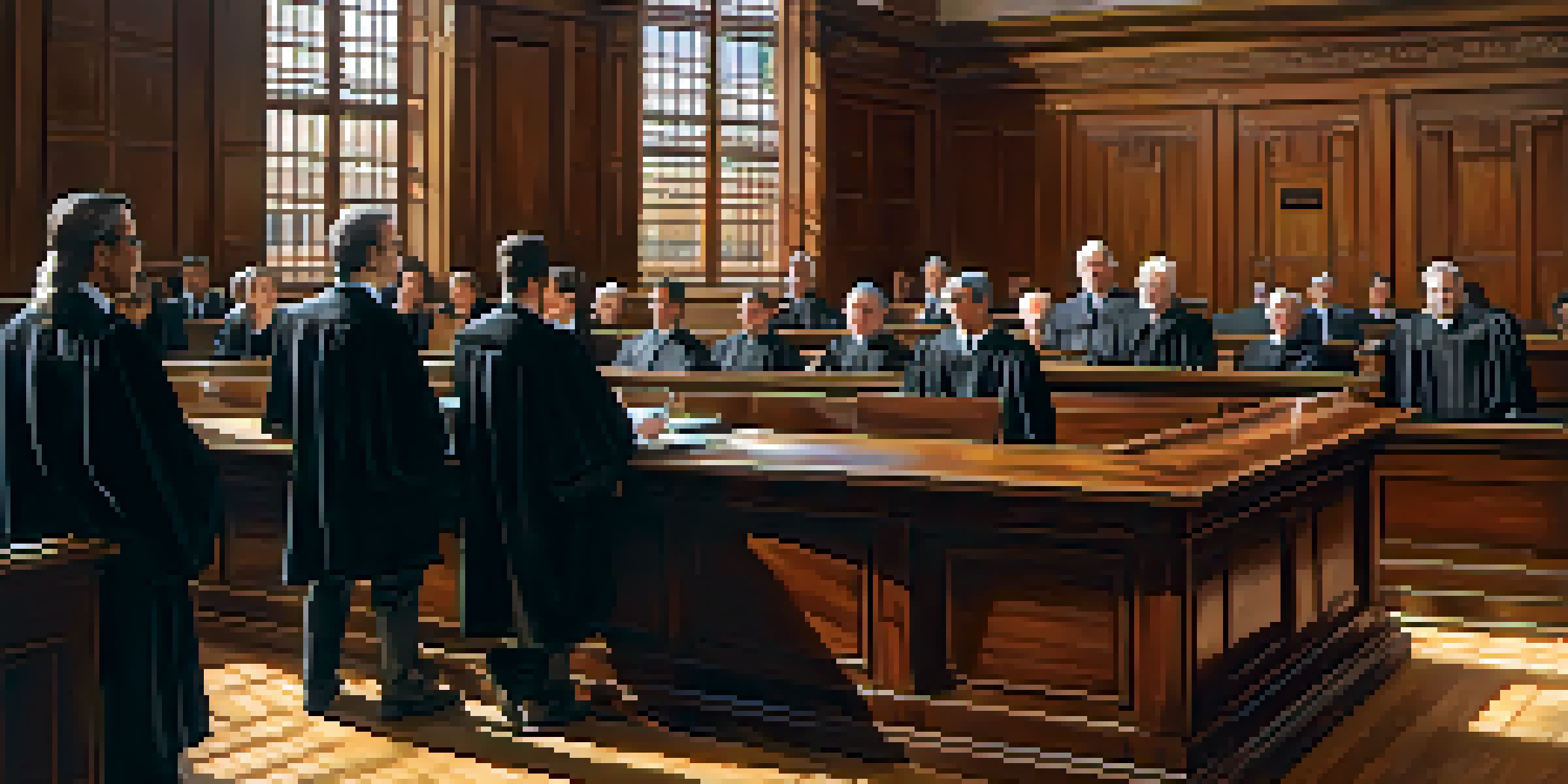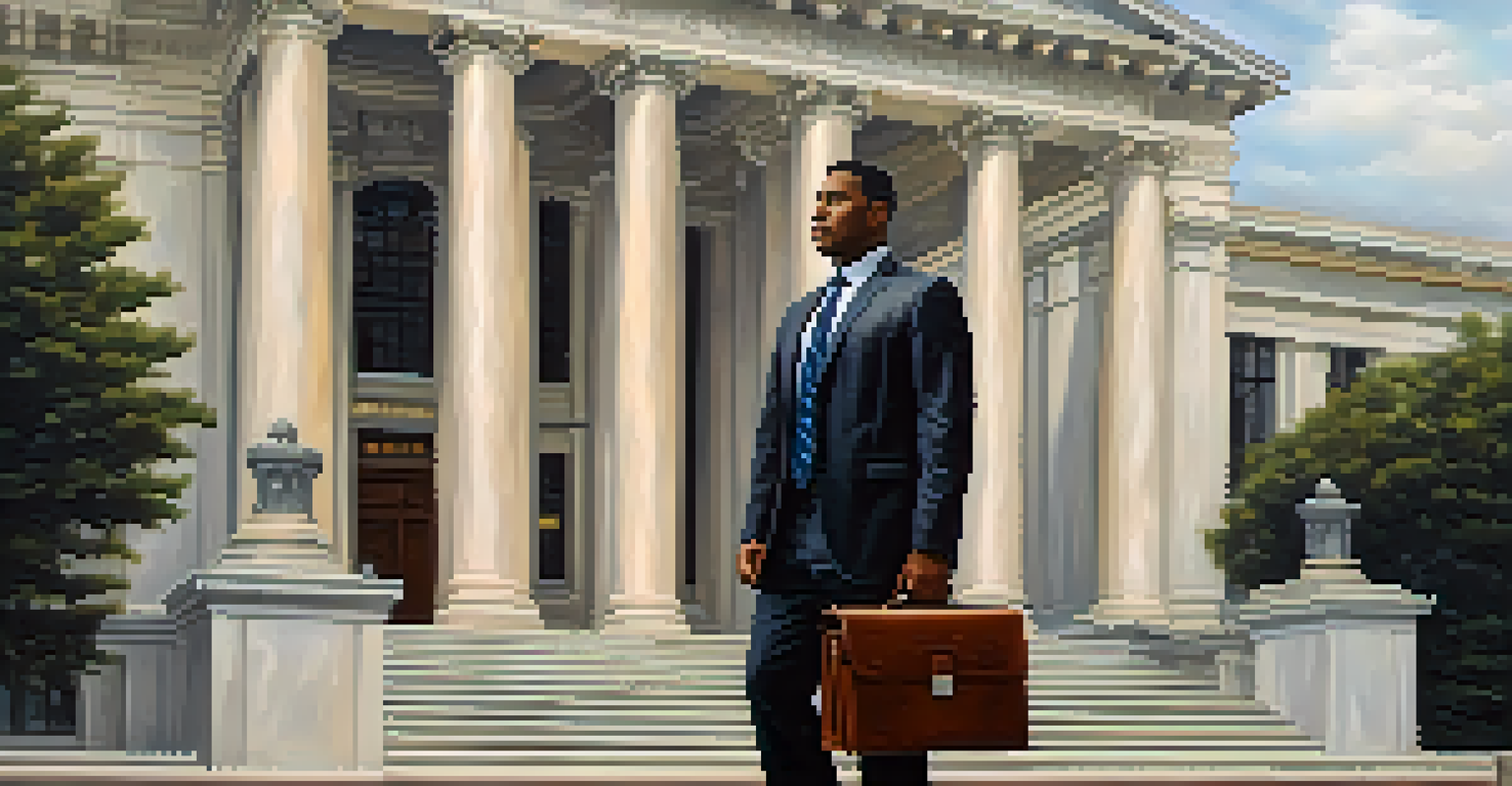Justice or Injustice? Hollywood's Take on Legal Systems

The Allure of Legal Dramas in Film and TV
Legal dramas have captivated audiences for decades, blending suspense and moral dilemmas. Shows like 'Law & Order' and films such as 'A Few Good Men' draw viewers into the intricate workings of the legal system. The high stakes involved in courtroom battles often reflect broader societal issues, making them relatable and engaging.
Justice delayed is justice denied.
These narratives often amplify the heroism of lawyers who fight for justice against all odds. Characters like Atticus Finch from 'To Kill a Mockingbird' serve as moral compasses, showcasing the struggle between right and wrong. This portrayal not only entertains but also prompts audiences to reflect on their own beliefs about justice.
However, the dramatization can sometimes skew public perception of the legal system. While these stories highlight the pursuit of justice, they can also oversimplify complex legal processes, leading to misconceptions about real-life courtrooms.
The Fine Line Between Justice and Injustice
Hollywood often explores the thin line separating justice from injustice, presenting morally ambiguous characters. Films like 'The Lincoln Lawyer' and 'Primal Fear' illustrate how legal professionals can manipulate the system for personal gain. This portrayal raises questions about the integrity of those who wield the law, challenging viewers to consider who truly deserves justice.

Such narratives resonate deeply, as they reflect real-world fears about corruption and bias within the legal system. High-profile cases often reveal how wealth and power can influence outcomes, echoing sentiments found in popular media. Viewers may find themselves questioning whether justice is truly blind or if it has a price.
Legal Dramas Shape Public Perception
Hollywood's portrayal of courtroom battles influences how audiences perceive the legal system, often blurring the lines between reality and fiction.
By dramatizing these conflicts, Hollywood encourages empathy for those wronged by the system. Audiences are invited to grapple with complex ethical dilemmas, fostering a deeper understanding of justice and its shortcomings.
Hollywood's Impact on Public Perception of Law
The portrayal of legal systems in Hollywood shapes how the public perceives justice and injustice. Movies and TV shows often depict a world where the truth ultimately prevails, creating a sense of hope. Yet this idealized representation can lead to unrealistic expectations about legal outcomes in real life.
The law is reason, free from passion.
For instance, the dramatic resolutions often seen in courtroom scenes rarely reflect the protracted nature of actual legal battles. Viewers might forget that many cases are settled out of court or dragged through years of litigation. This dissonance can foster frustration among individuals navigating the legal system.
Moreover, the media's focus on sensational cases can skew public opinion, leading to a lack of understanding about the complexities involved. As a result, audiences are left with a fragmented view of justice, influenced heavily by what they see on screen.
Injustice as a Central Theme in Hollywood Narratives
Injustice is often a powerful theme in Hollywood films, driving compelling stories that resonate with viewers. Movies like '12 Angry Men' and 'The Pursuit of Happyness' highlight systemic failures and the struggle for equity. These narratives not only entertain but also serve as a critique of societal norms, urging audiences to reflect on injustices faced by many.
By showcasing the personal impacts of legal inequities, these films foster empathy and awareness. They invite viewers to consider the plight of individuals who face discrimination or wrongful accusations, making the concept of injustice palpable. This emotional connection can inspire audiences to advocate for change.
Injustice Drives Compelling Narratives
Themes of injustice in films inspire empathy and reflection, prompting viewers to consider the real-life implications of legal inequities.
Furthermore, such representations can spark conversations about reform within the legal system. By bringing attention to these issues, Hollywood plays a pivotal role in promoting social justice and motivating viewers to seek solutions.
The Role of Documentaries in Portraying Justice
Documentaries provide a different lens on justice and injustice, focusing on real-life cases and their implications. Films like 'The Central Park Five' and 'Making a Murderer' delve into wrongful convictions and systemic failures, offering a sobering view of the legal system. These narratives often challenge the conventional portrayals seen in fictional dramas.
Through interviews and investigative journalism, documentaries highlight the complexities and human stories behind legal battles. They confront viewers with uncomfortable truths, prompting a reevaluation of their understanding of justice. This reality-based approach can be more impactful than fictional narratives, as it resonates with actual experiences.
Moreover, these films can catalyze public discourse and advocacy for legal reform. By shedding light on injustices, documentaries inspire viewers to engage with the legal system and push for necessary changes.
The Evolution of Legal Representation in Hollywood
Historically, Hollywood has often depicted lawyers in a narrow light, but this portrayal has evolved over time. Earlier films tended to reinforce stereotypes of the flashy, morally dubious attorney, while modern narratives showcase a more diverse range of legal professionals. This shift reflects broader societal changes and a growing awareness of the complexities within the legal field.
Today, we see more nuanced representations of lawyers, including public defenders and those fighting for civil rights. Films like 'Just Mercy' emphasize the importance of representation and the fight against systemic injustice. Such stories resonate with audiences, highlighting the critical role of legal advocacy in achieving justice.
Documentaries Highlight Real Issues
Documentaries shed light on actual wrongful convictions and systemic failures, challenging conventional narratives and fostering public discourse on legal reform.
This evolution in portrayal not only promotes a more accurate picture of the legal profession but also encourages diversity within the field. By showcasing a variety of perspectives, Hollywood can inspire a new generation of legal professionals dedicated to justice.
The Future of Justice in Hollywood Storytelling
As societal conversations around justice continue to evolve, so too will Hollywood's storytelling. The industry is increasingly tasked with addressing contemporary issues such as racial inequality, police brutality, and wrongful convictions. Films and series that tackle these topics can spark necessary dialogue and inspire action among viewers.
Moreover, audiences are becoming more discerning, demanding authentic representations of the legal system. This shift presents an opportunity for filmmakers to create stories that not only entertain but also educate and inform. By prioritizing authenticity, Hollywood can contribute to a more nuanced understanding of justice.

Ultimately, the future of justice in Hollywood storytelling lies in the balance between entertainment and social responsibility. By embracing this challenge, filmmakers can use their platform to advocate for change and engage audiences in meaningful conversations about justice and injustice.